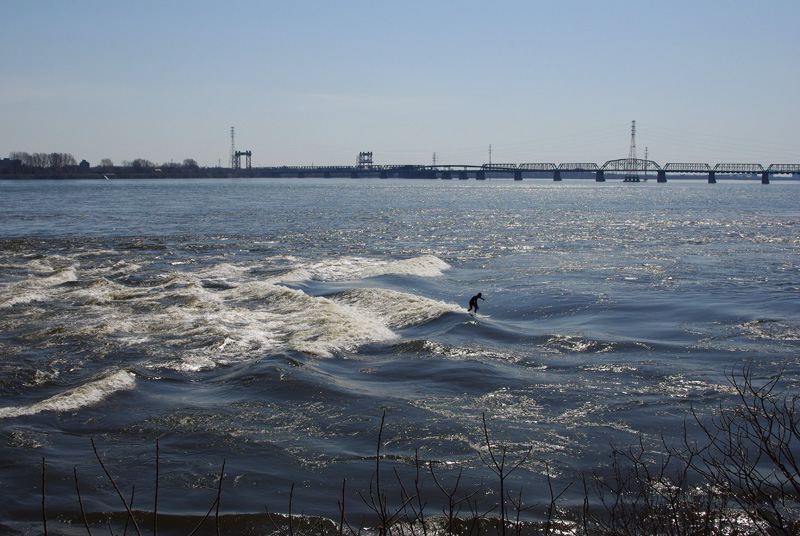
I Lachine-forsen bakom Habitat 67-husen flodsurfar man på den s k 67-vågen. Att vågen gett upphov till en liten surfscen känns ändå inte lika märkligt som det är att se brädor, takräcken och Billabong-loggor utan att känna doften av salt hav.



[B]reathing the chilly water can also save the brain, the organ most at risk during drowning. The body's impulse to respire is so strong that the lungs will continue breathing water in and out well after submerging. Studies on canines have found that mammals can continue breathing water for up to four minutes. Circulating that icy water through the lungs, Dr. Giesbrecht has found, cools the brain and reduces the body's core temperature.
In warm weather, if someone were to stay submerged in an outdoor pool for more than four minutes, “they will either be dead or have severe irreversible brain damage,” Dr. Giesbrecht said. “But the cooling of the brain increases the time you can go without oxygen. The tissue, as it gets colder, requires less oxygen.”
 Sedan några dagar mikrobloggar Douglas Coupland på Twitter. För ett par år sedan postade The Praized Blog ett stycke ur Couplands 15 år gamla Livet efter gud som ett tänkbart försvar av mikrobloggen. Ett fortsatt ganska välbehövligt försvar, Twitters air av högstadiet är inte särskilt smickrande. Frågan är nu om Coupland tycker citatet är relevant, kanske svarar han om man frågar på Twitter?
Sedan några dagar mikrobloggar Douglas Coupland på Twitter. För ett par år sedan postade The Praized Blog ett stycke ur Couplands 15 år gamla Livet efter gud som ett tänkbart försvar av mikrobloggen. Ett fortsatt ganska välbehövligt försvar, Twitters air av högstadiet är inte särskilt smickrande. Frågan är nu om Coupland tycker citatet är relevant, kanske svarar han om man frågar på Twitter?And if we were to collect these small moments in a notebook and save them over a period of months we would see certain trends emerge from our collection– certain voices would emerge that have been trying to speak through us. We would realize that we have been having another life altogether, one we didn’t even know was going on inside us. And maybe this other life is more important than the one we think of as being real– this clunky day-to-day world of furniture and noise and metal. So just maybe it is these small moments which are the true story-making events of our lives.